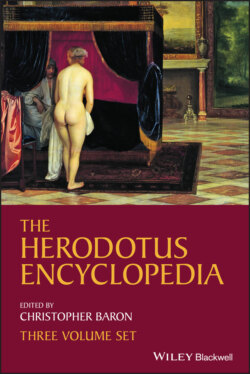Читать книгу The Herodotus Encyclopedia - Группа авторов - Страница 867
ATOSSA ( Ἄτοσσα, ἡ)
ОглавлениеROBERT ROLLINGER
University of Innsbruck
As wife of DARIUS I, daughter of CYRUS (II), and mother of XERXES, Atossa was a powerful female agent at the Persian court. Herodotus elaborates a Greek tradition found in AESCHYLUS’ Persians, where she was already a prominent figure (Brosius 1996, 8, 16–17, 48–51, 106–9). However, although activities of royal women are well‐attested in the PERSEPOLIS Fortification and Treasury Archives, Atossa is only mentioned twice in these texts, if at all (Ú‐du‐sa‐na in PF 0162, 0163, according to Henkelman 2010, 703 with n. 136; Tavernier 2007, 212 ad 4.2.835; Schmitt, IPGL 147 (no. 105), is skeptical).
According to Herodotus she was previously married to her brother CAMBYSES (II) (3.88.2) and became part of SMERDIS’ court (3.68.3–5). When Darius ascended to the throne, he immediately married Atossa and ARTYSTONE, another daughter of Cyrus (3.88.2), although the conspirators had previously agreed only to marry wives of their households (3.84.2). Thus Herodotus combines Darius’ striving for legitimacy with the king’s striking penchant for manipulation and dishonesty (Rollinger 2018). Darius and Atossa have four sons: Xerxes (7.2.2–3), HYSTAPES (7.64.2), MASISTES (7.82), and ACHAEMENES (7.97).
Herodotus attributes her an extraordinary, powerful position at court (7.3.4). This is in accordance with the Greek cliché of dominant Persian queens, although Atossa is not yet the stereotypical scheming female found later in CTESIAS’ Persica. Herodotus believes Xerxes became heir apparent over his elder half‐brother ARTOBAZANES due to his mother’s dominance and not because he was the first prince born while his father held the throne (Xerxes’ not being Darius’ eldest son is indirectly confirmed by an inscription from PERSEPOLIS (XPl)). It is also Atossa’s influence that results in the first Persian activities aimed at HELLAS (3.134). This is part of a famous anecdote about DEMOCEDES of CROTON, a PRISONER OF WAR who becomes Darius’ and Atossa’s private physician (Griffiths 1987). After Democedes had successfully treated the Persian queen for a swelling on her breast (3.133), Atossa fulfills his request to convince Darius to campaign against the Greeks. Democedes joins the succeeding reconnaissance expedition and grasps the opportunity to escape. Through this lens Herodotus offers a sophisticated explanation for the origins of the PERSIAN WARS: a Greek physician’s desire for FREEDOM, a thwarted and cunning Persian queen prepared to manipulate her husband to fulfill her DESIRE for female servants from Greece (3.134.5), as well as a Persian king’s overriding desire to expand his empire all lead to this final confrontation. A Persian queen at the center of DECISION‐MAKING and a Greek physician with access to the very private parts of the palace (and the queen’s body) are the enthralling ingredients of this master narrative (Bichler 2000, 288–91).
SEE ALSO: Causation; Medicine; Monarchy; Orientalism; Persia; Persica; Women in the Histories
